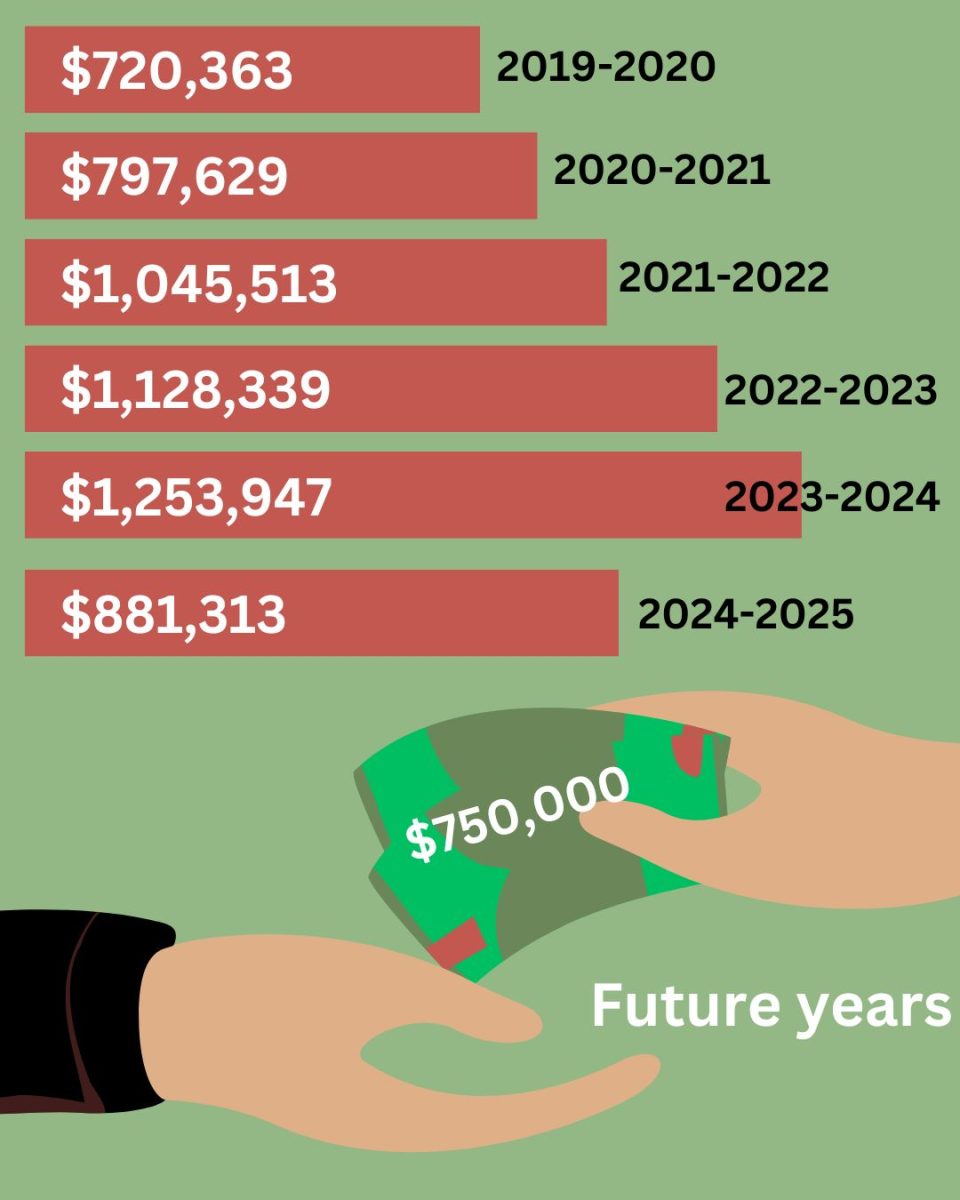CLIMATE CHECK
Senator Delhagen opened the meeting by reminding everyone of the voter registration event happening on Tuesday, Sept. 17. Senator Delhagen encouraged other senators to volunteer and attend.
President Areola shared that students had been expressing concerns about dining at Coates Student Center. Specifically, she had heard that the Boost app was not working for Taste of San Antonio, and that there was a desire for more rotating restaurants and a better menu.
CLASS OF 2025 SENATOR VACANCIES
There were three vacancies for the class of 2025 senators set to be voted on by the current senators in this meeting, and four candidates who had applied for the position. Three of the candidates, Pierce Jackson, Johnny Kousa and Blake Lin, showed up to the meeting to speak to SGA about why they should be elected as a senator.
Pierce Jackson presented his case over a pre-recorded video which was played at the meeting. Jackson shared that if elected, he would work to make SGA less of a “foreign entity” and make visiting a variety of student organizations on campus a priority. Jackson emphasized that his experience in a variety of organizations at Trinity, including athletics, Black Student Union and The Hidden Opponent, made him an ideal candidate for this role. Jackson presented over a pre-recorded video, so there was not an opportunity for questions.
Johnny Kousa shared that after living for 14 years in Kuwait, he had struggled to make meaningful connections in high school but had found a welcoming community here. By becoming an SGA senator, he explained that he hopes to help others find a welcoming community here like he had. Senator Martin asked if elected, what projects he would like to work on, and Kousa answered that he hadn’t thought about it, but would apply his creativity to come up with ideas.
Blake Lin shared that he had a diverse range of experiences to bring to the role including that he was a part of the football team and a student philanthropy officer for Phonathon. If elected, he had two main goals, including to ease the process for students seeking accommodations and to improve resources for STEM students. There were no questions for Lin.
During deliberation, Senator Martin shared that he appreciated Lin’s vision for Trinity and the specific goals he had. He also emphasized that to do well, a candidate needs a vision. Senator Mitra appreciated Jackson’s focus on making SGA more accessible to the community and the fact that he had prior experience in SGA.
Chief of Staff Tinker then explained how voting would work. To elect a candidate, a senator would need to make a motion to vote that candidate into office. If the motion were seconded, it would be voted on, and if a majority was in favor, the motion would pass and the candidate would become an SGA senator.
Senator Stovall made a motion to vote Pierce into office, which Senator Martin seconded. The motion was then passed unanimously. President Areola proposed that someone bring up a motion to elect Kousa into office, which none of the senators did. Senator Mitra explained that he agreed with Senator Martin’s earlier statement that a senator should have a vision. Senator Stovall seconded and elaborated that Kousa lacked a clear vision and plan.
Senator Hermoso spoke up and said that even though Kousa might not be “your typical SGA candidate,” he had a different perspective to bring to SGA. Senator Hermoso also emphasized that “we’re [SGA] not the most popular club on campus,” so perhaps they should be more open. DEI Chair Hatchett said that while the speech was different, it had a perspective not present in the room and that there is a level of bravery and honesty in saying that you don’t know what you’re getting into but that you’re willing to learn.
After more deliberation, Senator Martin eventually brought forward a motion to elect Kousa which Senator Mitra seconded. The motion then passed unanimously. Senator Martin then brought forward a motion to elect Lin and Senator Roskamp seconded. The motion passed unanimously.
CLASS OF 2026 SENATOR VACANCIES
There were six candidates, Collin Bishop, Marcus Vondrak, Cade Spaulding, Grace Keller, Alexander Brown and Justin Wartell, for the class of 2026 senators and one opening. All of the candidates spoke before SGA at the meeting.
Bishop emphasized that he wants to continue the trend towards innovation and inclusion at Trinity. If elected, he promised to commit to listening to classmates and making sure their voices were heard. Senator Cinque asked Bishop if he had any specific ideas for keeping Trinity at a high standard, and he responded that he hadn’t thought much about what a senator really does, but once he had an idea, he would be able to contribute.
Upon seeing that Bishop was also running, Marcus remarked, “I’m never winning this,” and said that he almost wished to drop out so that Bishop would have a better chance. He did not have a speech prepared, because President Areola had told him this would be “lowkey,” so he spoke on the spot.
He shared that as a member of the football team, a lifeguard and a member of the Catholic student group he wears a lot of hats. DEI Chair Hatchett asked him what he wanted to achieve as a senator, and he answered that he was going into this with no personal motives because he didn’t believe that was appropriate, but that his goal was for SGA to serve the student body and bridge the gap between underrepresented organizations on campus.
Spaulding started his speech by arguing that most SGA candidates would be extroverted and go-getters, but many people at Trinity are not, leading to a bias in SGA toward extroverted people. He said that if elected, he would represent all of the underrepresented introverted students at Trinity. Senator Martin asked him what projects he would try to pursue for introverts on campus, to which Spaulding responded that he had not thought of that question, but he saw his role more of helping others to adapt their projects to be more introvert-inclusive rather than creating initiatives on his own.
Keller said that her involvement in theater at Trinity has granted her insight into the needs of neurodivergent students. She said that she appreciates the spaces that SGA creates to unwind, but that she would like to see the addition of smaller-scale events so that those who get overstimulated at larger events or struggle to make connections with others in those contexts can have an opportunity to still get involved. Senator Cinque asked her how she would target smaller groups, and Keller shared that she would emphasize low-maintenance events that people can come and go easily from.
Brown shared that while he had been working to start the Addiction Awareness Association at Trinity, he experienced difficulties with the process that he would have appreciated greater help from SGA in navigating. Brown also explained that a rise in attacks against students organizing on other campuses had him concerned, and that he would like to see SGA commit to protecting cultural and political organizations on campus.
Wartell explained that as the recruitment chair of the Triniteers, he was able to help a peer figure out the process and that that influenced his desire to take on a bigger role in representing his class. Senator Delhagen asked him what specific things he would do if elected, and Wartell responded that he had noticed that SGA had spent money on things that hadn’t had much engagement, and his experience would help him fix that.
To begin deliberations, President Areola explained that they would see what candidates came to the top, and then vote from there. Senator Delhagen expressed support for Keller and Brown because of the unique perspectives they brought to the table. Senator Roskamp appreciated Vondrak’s confidence and that he had a lot to say despite not being prepared. Senator Martin shared that he had witnessed Bishop standing up for marginalized groups on campus in the past, and believed that that spoke to his character.
After more deliberation, President Areola stated that Bishop, Vondrak, Keller and Brown appeared to be rising to the top. President Areola then took a poll of those four candidates in which Keller received three votes, Brown five, and Bishop and Vondrak one each. President Areola then held a vote between Keller and Brown in which Keller received five votes and Brown six, making Brown the final choice to fill the 2026 senator vacancy.
President Areola ended the voting by remarking, “Tell all your friends to run next year so we don’t have to do this.”
OFFICER REPORTS
President Areola shared that the constitutional amendment to allow residential assistants to join SGA passed by a two-thirds majority. She also shared that applications for first-year senators would be opening soon, and that guidelines for campaigning would be sent out over email.
President Areola also called for a show of hands about who would be available to attend the Maverick lecture on Sept. 19. Senators Mitra, Martin and Delhagen and Collaborations Chair Wolff agreed to attend.
BYLAW VOTING
Chief of Staff Tinker began by explaining the rules for calling an executive session. A senator may motion for an executive session whenever there is an issue that requires a higher degree of sensitivity. Vice President Waters stressed that executive sessions should be rare to avoid overuse.
All amendments in Article I, Section 4 were passed unanimously. These included updating wording and removing the secretary and legislative relations chair. In Article II, changes to the attendance policy and the establishment of an accountability system in which each senator would be required to attend two cultural or identity-based events a semester were unanimously passed.
Updates to verbiage in Article IV were unanimously passed, but a proposed addition to the proxy vote system caused a halt in the series of unanimous votes. Senator Stovall expressed concerns about there being a proxy vote system, because those voting by proxy do so 24 hours ahead of time and aren’t present for the presentations or deliberations at the meeting which might impact their vote.
President Areola shared that proxy votes often occur on funding requests, but the information shared on the funding request form is often incomplete and that presentations at the meetings help greatly in making decisions. President Areola, however, also noted that proxy votes help in maintaining quorum, and at SGA meetings like this one where there were only 11 senators present, if even one were to leave quorum would be lost and they would be unable to vote on anything, which can be frustrating for presenters who came to have their issue voted on.
Senator Stovall said that she hoped with the new attendance policy losing quorum would become more rare, and Senator Delhagen shared that it is unfair to have organizations come and present only to be faced with a proxy vote by someone who didn’t listen to them. Vice President Waters said that they could approve the proposed change to the proxy system — which was to require those voting by proxy to send a reason with their vote over email — for now, and if it didn’t work out they could vote to remove proxy voting later.
Senator Delhagen motioned to remove proxy voting and Senator Stovall seconded. The motion went to a vote, and seven senators voted in favor of removing proxy voting, three voted for not removing it and one senator abstained.
A motion to table voting on the rest of the bylaw changes until the next meeting was unanimously approved.








